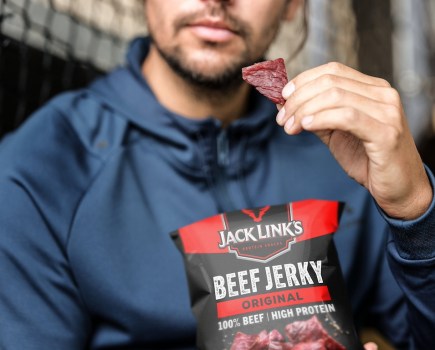Protein bars are a go-to post-gym snack for many of us, but are they healthy? We caught up with the experts to find out more.
Protein is one of the main nutritional building blocks of muscle growth, and getting enough is crucial whatever your fitness goals. In an ideal world, you’d get the recommended 0.75g of protein per kg of bodyweight per day from natural sources (meat, fish, dairy, lentils) but busy schedules mean that sometimes supplements like tasty protein shakes or the best protein bars can often be more convenient – particularly after the gym. But are protein bars actually healthy?
“They are good quality of protein – typically, if you get a dairy product, it comes from milk, so it’s very similar to a protein shake source,” explains Alex Levington, performance nutritionist at Strength and Nutrition Performance Coaching. “It typically comes from a whey protein, and we know that on the protein index score, it always scores one – the highest – alongside eggs, meat, fish.”
He adds that they also have an advantage over more natural food sources in that they’re quick, convenient and easy to throw in your gym bag for a post-workout hit of protein. “If you’ve got time to go down the shops, and get yourself an actual provision – some fruit, nuts, milk – that’s going to be a better quality but that’s gonna take an hour out your day.”
Can protein bars be part of a healthy diet?
Levington says that there are some considerations when it comes to using protein bars though, and how they fit your wider fitness goals: “A protein bar can be up to 300 calories. If you’re trying to lose weight, a protein bar is already 300 calories of your daily allowance, which is quite a lot from a small bar, whereas for an athlete where we want them to eat lots and lots and lots of food, it’s actually a very good thing because it’s 300 calories – so there are two ends of the spectrum to think about.”
Even if protein bars do fit your daily calorie goal, he suggests using them as part of a balanced diet and warns against solely relying on them. “If that’s the main source of your protein, you’re going to have quite low quality balanced diet – you’re going to have stomach cramps, reflux, not enough fibre – and you probably need to improve other habits because you still want a good quality nutrition.”
Ultimately, this is because protein bars are ultraprocessed and aren’t very nutrient-rich compared to healthy, natural food sources. “They’re pretty much a top up of good quality protein and that’s it,” adds Levington. “If you already have a very good diet, [protein bars] can be part of a healthy provision. If you have a poor diet and you’re relying on these, then go for something that’s more wholesome because you’re going to be missing nutrients.”








